Monarchy, Mortality, and Morality.
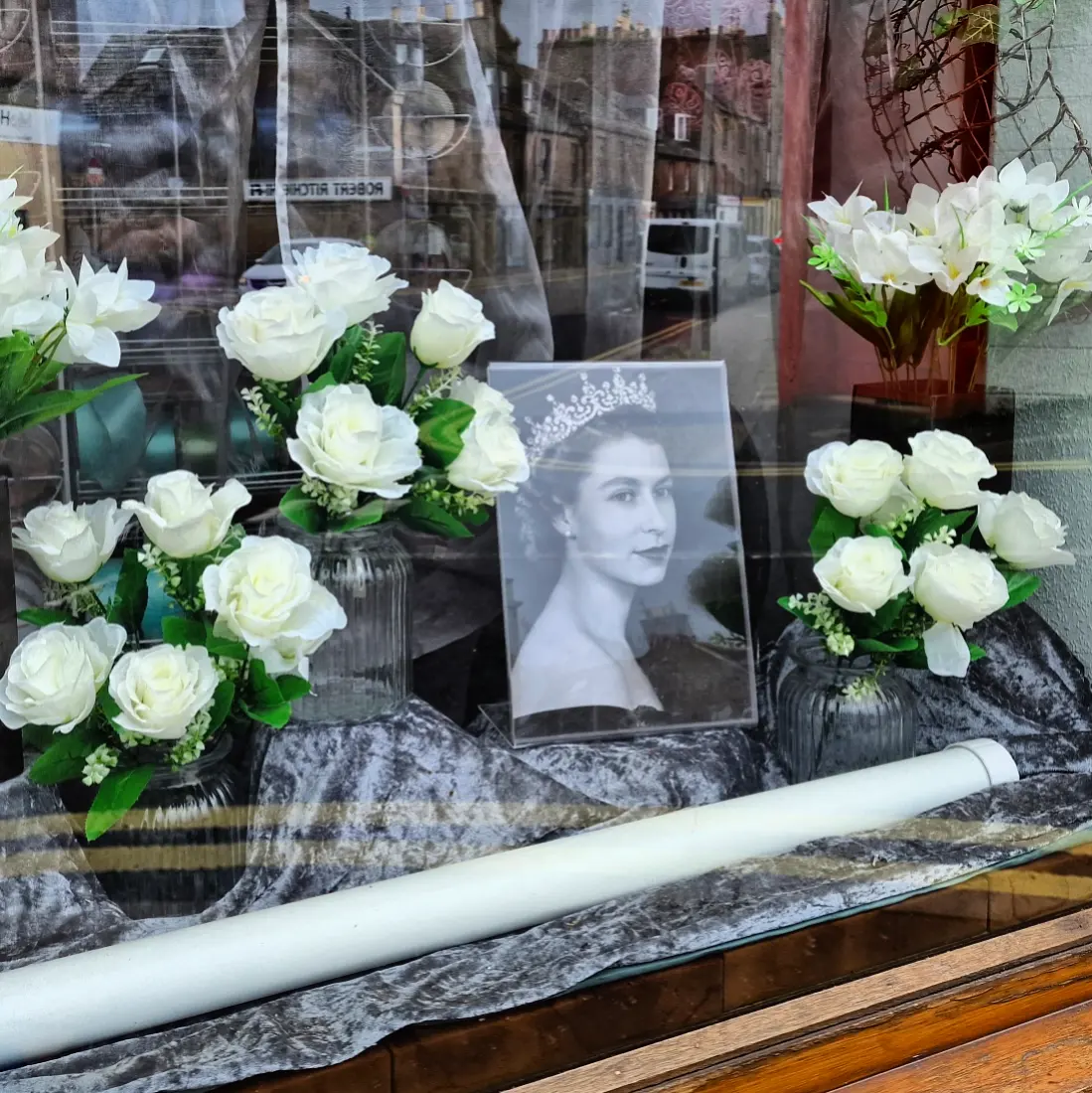
I never met The Queen. Neither did most of you. But I’m willing to bet that every single one of you had some sort of emotional reaction to the news of her passing. For my part, I have been reading the book of revelation, and Paul’s address to the Romans, in making sense of this event.
If you are American, like my wife, you are probably deeply confused by the global outpouring of sincere grief at the loss of our Monarch, Elizabeth II. After all, wasn’t she just a boring old lady who didn’t do anything? Isn’t Monarchy and Empire bad? Aren’t British people so stupid? Don’t they know they could have Joe Biden in charge of them instead of all this malarkey?
The shrieking from juvenile leftists on Twitter and in the traditional press this week has been dreadful. Yes, we all get it. You hate authority. You hate wealth. You hate Britain. You believe in a Republic, not a Constitutional Monarchy. And you’re so tough, that ‘you don’t know what the big deal is, she was 96, she wasn’t going to last forever’.
Right?
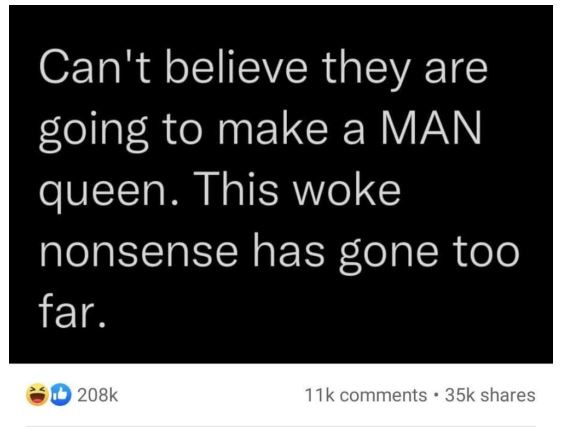
Tough guys, everywhere, eh?
The day the news broke, I penned an additional Substack article and went for a walk along the storm-battered Angus coastline. When I returned to the ship, we had dinner in the messroom, and the news of Her Majesty’s death was confirmed.
A Merchant Navy mess deck is a merciless place. I will not repeat the details of the gallows humour that filled the air. Needless to say, it revolved around closing the schools in Scotland now that Prince Andrew is in town; The Queen has gone back through the Stargate to lizard-world from her pyramid at Balmoral; Jimmy Saville will fix it, and so on. (Free speech advocates take note. You’d love the Merchant Navy. No HR departments).
With sufficient callousness demonstrated to our fellow men, the bravado subsided. The comments quickly faded, and changed to ‘Nah, The Queen was alright’. ‘This is weird’. Disbelief.
A tinge of sadness crept in. The Queen is the ‘Master of the Merchant Navy and the Fishing Fleet’ of the UK. We lowered our flag to half-mast and made an entry in the logbook. The harbour and the other ships sheltering in port did the same.
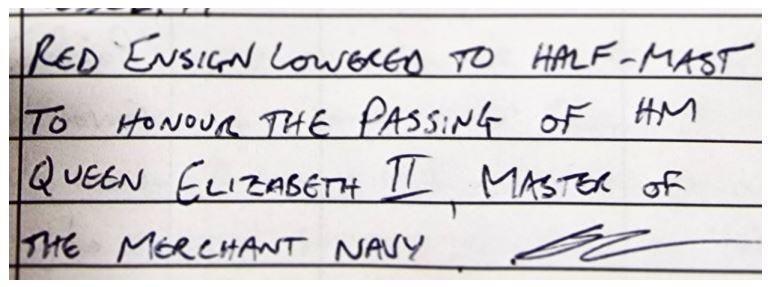
A gale of wind and heavy rain battered us through the night, to the next evening.
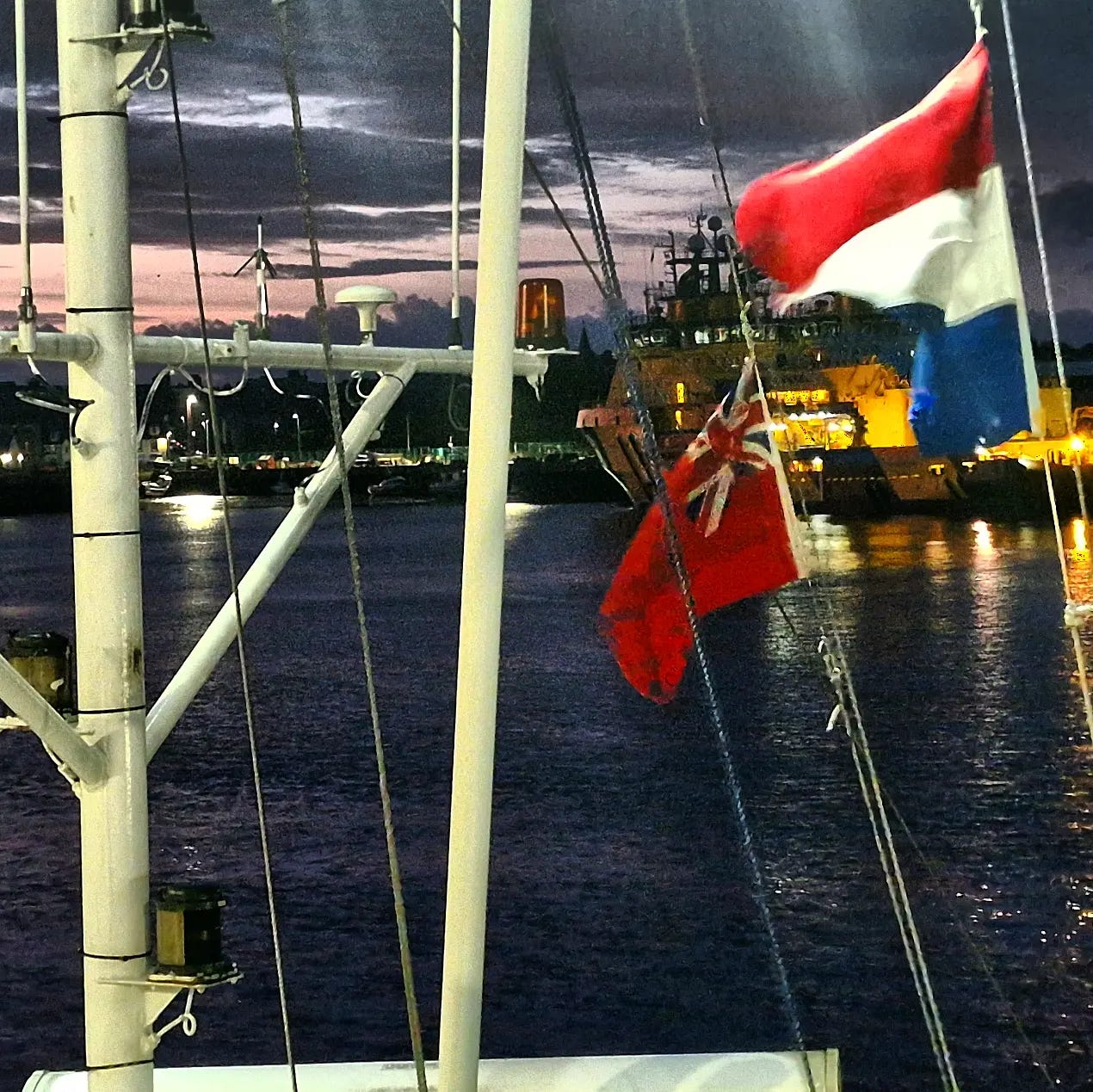
Moments of grief came in private conversations, one-to-one. ‘I met Charles and Camilla once. They were alright.’ ‘What are we going to do now’? ‘Will we be signed-off in time for the funeral’?
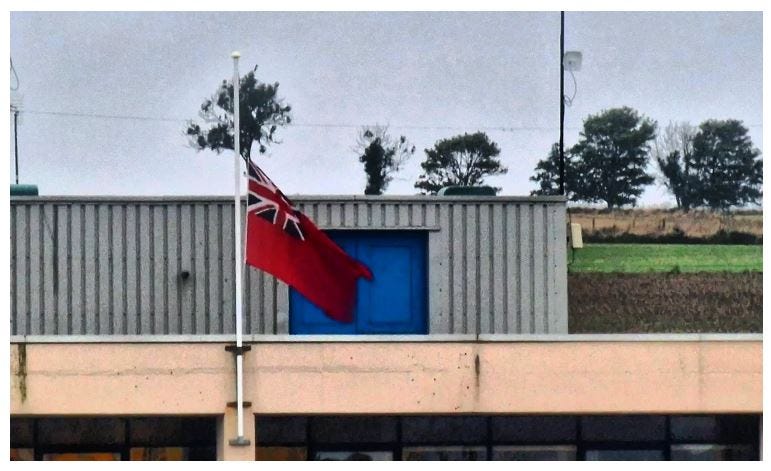
I’m no statist. The primary business of government is warfare. Defence of the realm if we’re being generous. The Queen knew that intimately, as a soldier, and as the Commander in Chief of all our Armed Forces. She has stared evil in the face many times, from the second world war, through to last year’s Afghanistan debacle.
And unlike many of her critics, she personally attended to the wounded and grieving survivors of those conflicts. Unlike the Twitterati, she had the grace to look people in the eye, before and after sending them into real harm’s way.
The current American model of neo-fascistic, monopolistic, deep-state, militarised government is the corporate model taken to its extreme. Endless war, followed by endless medicalisation, spending and inflation. It is the result of an amoral production-line mentality being applied to the affairs of State.
For a nation that claims to hate corruption, and love ‘mom and pop’ stores, Americans should really be better able to discern the advantages of monarchy.
After all, with only two terms in office permitted, a President really has no time to waste in stuffing his pockets with brown envelopes and committing the nation to debts that line the pockets of his political allies before leaving office for the corporate bribe-fest. Nobody changes the oil on a rental car, or in a fascist economy. Ownership is an important value in any leader.
Monarchy is the mom and pop version of an admittedly amoral business. More Tony Soprano, than Robocop. But a family affair, at least.
The whole point of a hereditary system is that the ruler won’t be so corrupt as to squander everything because they need to leave something behind for their children. And not just a trillion-dollar pile of IOUs. Not a concept the current US Democrats are familiar with.
At times like this, when everything is ultra-politicised, it is deeply worrying to see that so few of our loudest fellow citizens have taken the time to actually contemplate what the nation-state is, or what it does.
The first time I had an AK-47 thrust in my face, I was in Ho-Chi-Minh City in Vietnam. It was around 2009, and it was my first time in Asia. I had joined a rather nice cruise ship in Hong Kong, and we were working our way westbound on a world cruise. I was not used to 40°C heat, being born at 58°N in Scotland. Perhaps it was my near translucent skin that attracted attention?
After a long walk around the city, and a nice excursion to an English language bookshop, I sat on a brick wall in the shade to wait for the shuttle bus back to the cruise ship. As I wiped the perspiration from my brow, my hand fell away, and the barrel of a gun came into sharp focus ahead of me.
I was stunned.
A ‘policeman’, in military-looking fatigues, gestured with his gun that I stand up. I couldn’t understand a word of what he was saying but complied with the gesture. I mumbled ‘I’m sorry I don’t understand’, as the blood in my circulatory system tried to remain seated and ended up heading south for my stomach.
He didn’t care. He walked off and kept a beady eye on me from the other side of the street until the bus came.
He didn’t want to steal or extract a bribe from me, charge me with a crime, or inspect my passport. He threatened me with a loaded gun simply because he wanted me to stand up.
In that moment, I didn’t stop to ponder what the structure of government was in Vietnam. Later, on reflection, I was simply grateful that I had grown up in a country where the police did not behave like that. Like the abject and obvious petty thugs that they are in so many countries around the world.
Yes, all forms of government are corrupt. They are based on a variation of the problem, that those who are the best at violence tend to end up exempt from the laws that apply to others. That is the root of nobility and monarchy, it is true. But violence is also the root of revolutionary republics, communist, technocratic, or national-socialist states. Most everything they do depends on the violation of property rights. Taxation is legalised theft.
But at least, in the West, they put on a nice suit and speak to you politely when they’re doing it! Something that should not be under-appreciated.
As we sailed back out to sea, I noticed the poverty of the boat people living on the river. I was struck to see one woman so poor she didn’t have a boat. All of her meagre possessions were laid out on the river rock where she lived.
One older Russian officer told me how much better things now were in Vietnam than in previous years. He recalled coming there in the 1970s on cargo ships and passing dozens of dead bodies floating in the Ho-Chi-Minh River, each time.
I grew up poor, in relative terms, in the UK. But there was never any danger of facing that kind of poverty, or that kind of violence in Scotland.
I have been to every continent except Antarctica. I have seen many countries. And not from the agreeable perspective of a tourist, businessperson, or passenger. I have been there as a working man. Entering via the least well-heeled part of any town – the docks – and dealing with the thuggish authorities of many a government.
I know the flaws of my own country deeper than any American who has never been to Britain. And probably better than most, as the husband of an immigrant. But I am grateful it is not worse.
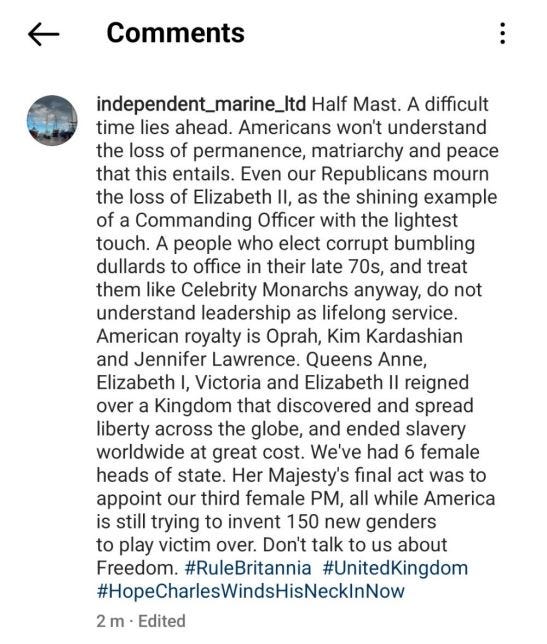
And in this difficult time, as we as a nation contemplate the death of our Monarch, we face the great equaliser.
Mortality pays no respect to social status, class, ancestry, or wealth. It comes to us all. In this we are equals.
Much of the callous name-calling on social media, or the theories that ‘The Queen isn’t really dead’, comes from a place I know well. The desire to feel strong in the face of mortality.
As a younger sailor, I used to keep a mental note of all the times I could easily have been killed at work. Being crushed by cargo. Asphyxiation or poisoning by dangerous chemicals. Slips trips and falls in a seaway. I’ve witnessed pirate attacks off Somalia, back in the day. Ships catching fire. Flooding. I even fell overboard once and got stuck between a ship and a quay wall.
After a while, your tolerance builds, and some of these ‘near-miss’ incidents don’t bother you anymore.
You realise that a well-found ship can make you feel strong. But that is only temporary. Unless maintained, the natural state of all things is brokenness. ‘A ship only lasts as long as a whores’ moan’, as Frank McCourt would say.
Such adventures are nothing, compared to the moments you may face together with your partner if you are lucky enough to have children together.
Aside from the deeply humbling concern that you do not know if your child will be born healthy, or whether you are about to enter into a lifelong commitment to care for a disabled person, there still remains the risk of death in childbirth.
My wife had an emergent C-section in Charleston SC, after a version-induced labour. So, when we had our second (now-middle) child, Arthur, it was her first natural birth. There were concerns with her C-Section scar initially, and we had tried for a long time to have our second. My wife had suffered circulation issues, so I’d been administering injections to her for several months, daily, to prevent blood clots. There was a concern that these injections might have weakened her previous scar tissue, and that it might open during labour.
As a ship’s medical officer, I was cheerfully hands-on in the delivery room. The nurses commented that most dads would pass out after seeing so much blood, but I enthusiastically helped them clean up as my wife went through a long labour.
When my son was born, he was not crying. He was blue and unconscious. The nurse quickly resuscitated him in a corner of the room right in front of me. As I took my shirt off, the room filled with strangers. I cradled my son on my skin to regulate his heartbeat and maintain his body temperature, as advised. The doctor, midwife, anaesthetist, and surgeon said that my wife was still losing too much blood and that they would like to operate on her. Would she consent?
My wife looked to me in her drug-impaired state for advice. ‘Just say, yes’! I implored.
The time I spent alone cradling my newborn son, contemplating life without my wife, was real and eternal.
Neither my son nor my wife remember that moment. I will never forget it. On that day we were bonded forever, in contemplation of mortality.
That is how our nation feels now.
Searching for a vision of what life will be like, without our matriarch.
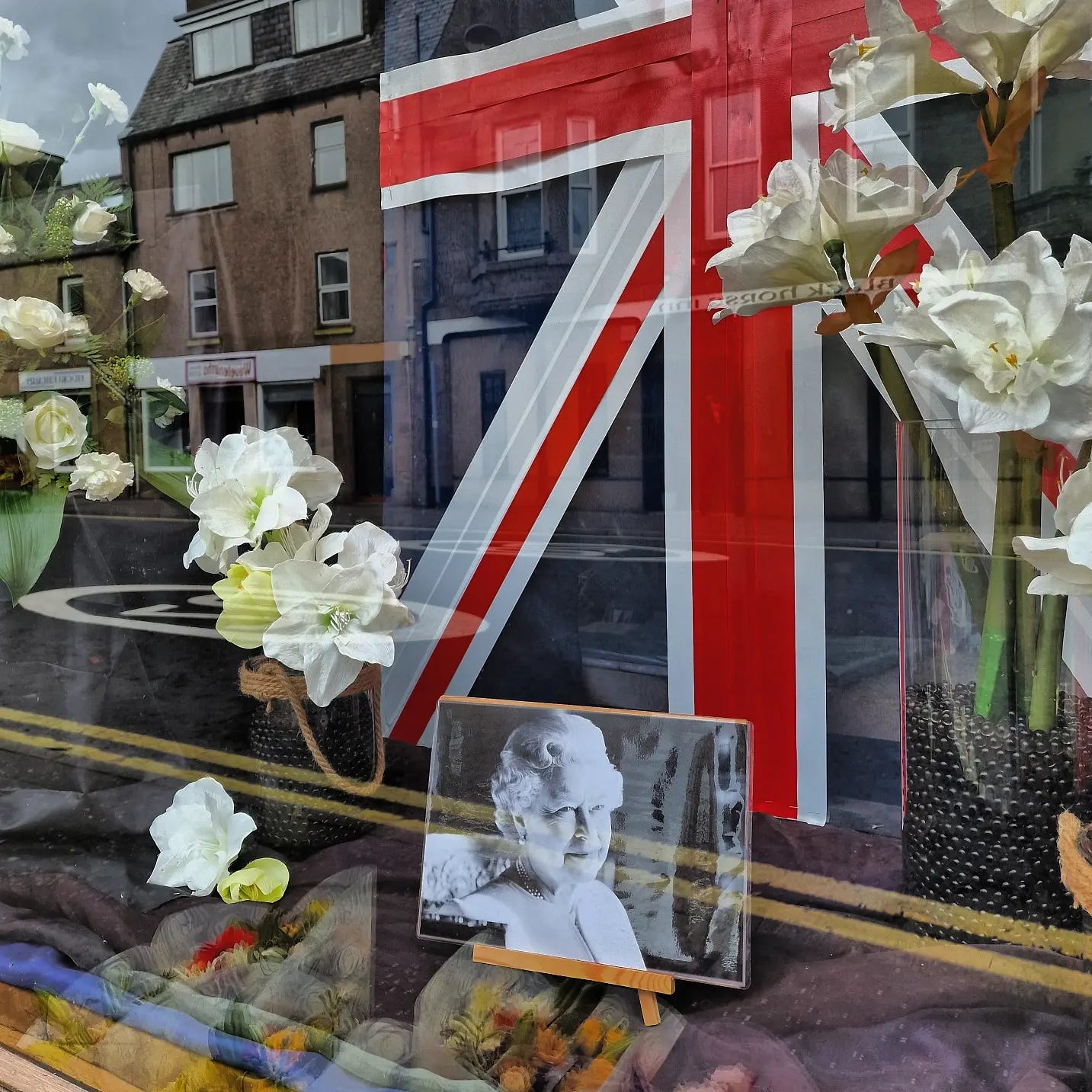
I missed my son’s birthday last trip, and my wife’s last week. This year I will not be there for any of my children’s birthdays.
When I call home, my wife says my son is upset the whole time I am away.
He refuses to look at me and hides behind the rocking chair when I make a video call home.
I don’t blame him.
I hate myself for being too absent. Particularly with him. He doesn’t want a conversation at four years old. He wants a wrestling partner. Someone to take him on adventures in the woods. Someone to let him break things with tools in the back garden.
Every family has problems. Death is punctuation in our lives, that forces us to reflect on them.
When my grandmother on my mother’s side passed away, I found it really difficult. Not because I missed her so much.
Truth be told, I didn’t like her much. Particularly near the end. The misery, the guilt trips and the negative comments were too much. I could barely look her in the eye the last few times I visited her.
I know she had a victim story. Her biological father was a POW of the Japanese in WW2. He never spoke of it and died young after the war. She grew up as a troubled stepchild. Alcohol, five children, and at least one miscarriage I know about, brought her to divorce and ruin.
It affected my parents’ marriage, and so much more. The pain of all that trauma has bled through the generations and bruises us to this day.
Sometimes the pain at a funeral is the agony of the knowledge that things didn’t have to be this way.
The pain is that we can now see the final score, and the shortfall against potential redemption that appears so final.
People really loved The Queen. She was a matriarch and a warrior. A presence that gave a sense of memory to our people. A conscience to be faced. The loss of Elizabeth II is a very real blow.
But it is also now an opportunity for the psyche of the nation to realign itself.
Prince Charles, I think, must be the least popular member of the Royal Family. Certainly, among the people I know. And when you look at Andrew, consider, that there was some pretty strong competition. Not just because of his troubled marriage to Diana Spencer, but because of his eco-activism and expensive biscuits. Every time he wades into some campaign of activism, he threatens the equilibrium that is the delicate balance of the body of law that is our constitution.
He will not likely be a defender of the faith, because he is a Gaia-worshipping polytheist. He is a relativist. As such, he cannot respect the covenantal rule of law that stands above him and requires him to subjugate himself to a higher authority.
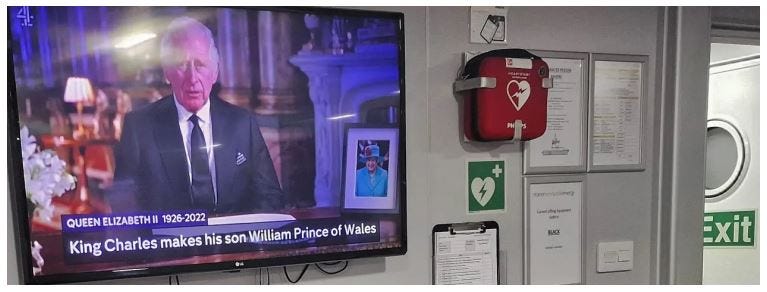
I hope, like the death of my own two grandmothers, the death of Queen Elizabeth II will act as a call to maturity for the nation. A King, in place of a Queen, is a sign that the adolescence of a long generation is over. A sign that a new age is dawning, and that we need to change.
The cautious apprehension that we feel, as we look at our new King, and our newborn self-image, must not be romanticised or delusional. It must prompt us to look at our lives with freshness and vigour. We must rediscover our history and philosophy and use them properly.
Yes, Charles scares me. He is a limousine liberal, champagne socialist. I don’t believe that he is a Christian. I do not trust his words when he says he will continue to uphold his mother’s legacy.
He has earned no such trust in the popular mind. Not that I can see. Perhaps he will?
However, here is the good news.
I believe he was speaking the truth in his address to the World Economic Forum when he spoke on the topic of the Great Reset. He said that they only have one chance to pull it off and that they ‘may never have this opportunity again’.
Consider why.
The dream of one-world government is nothing new. It has been the dream of every despot since Plato put that poison in Alexander the Great’s mind, and even before.
How different is a social credit score, from your current credit score and tech censorship? How different are CBDCs from an inflation policy that you have no control over, as a consumer? How are digital passports, any different from passports?
When we see that the Great Reset is attempting to achieve a difference of degree, not of kind, then we can begin to tackle the problem seriously.
What has changed is that distributed network technology makes centralised control redundant, in theory. With the advent of the algorithm, there will be no exemptions from the rules. Those people who make unfair wealth and have undue influence due to their magical position as philosopher king, will lose their authority in a rules based economy.
Machines will not have the emotional capacity to fall for their manipulations.
As such, the race is now to centralise the control of decentralised network technology, to secure the hierarchy in place, before all privacy is ended and people can deal with each other entirely peer-to-peer. It is even more of a threat to modern nation states than when radio and TV broadcasting emerged in the 1920s and 1930s, and had to be centrally licensed and suppressed.
We are at war. It is not the economic war with China and Russia they’d have you believe. It is the war for control of the new world order after the next financial collapse.
If it weren’t for blockchain, the internet and nuclear weapons, we’d probably just be having a conventional war between states. But we’re not.
And here’s what Charles understands about that.
The reason they may never have this chance again is because the same technology they would use to enslave us permanently, can be used to defend ourselves against the corruption of the overgrown state, permanently.
After the blatant hypocrisy and evil of the post-2008 ‘too-big-to-fail’ bail-ins, people got busy on the internet making sure that more folk than ever were aware of the scam that is fiat currency, and the evil stealth tax that is currency inflation. Operation mockingbird showed cracks.
The tools to live without these evils already exist, and that is why the WEF, and the UN countries are overplaying their hand in a mad rush to preserve their control over a dying order. Their survival, as net consumers, depends on it.
The feminists hate The Queen because she was a soldier, a head of state, a defender of Christianity, of charity, and a mother. All while calling each other ‘Queen’, unironically. They hate her because she was a conservationist of the English Reformation. They hate her for not being a cry-bully victim or a socialist. The socialists in general hate her because they want the power. And boy, would they use it. Democrats hate her because they hate everything that isn’t sanctioned by the mob at any given moment. She was a colonialist. She decolonised too quickly. She was too wealthy. Take your pick. I’m not going to debate the details. Read Niall Ferguson’s Empire, or Vishal Mangalwadi’s The Book That Made Your World, before you go down that road.
So, here’s the problem with the Queen-haters on the internet. Resentment solves nothing.
What each of these groups fails to do, is imagine how much worse things could be. If we’d had Charles when he was 23 years old, instead of now at 73, how difficult would this transition be. Having sailed with a chief officer who trained under his father, I for one am grateful at how old Charles III is on taking the throne.
At the very least, you should love your enemy long enough, to study what makes them powerful, effective, and persuasive opponents. Even if you consider monarchy a great evil and injustice, look at how they behave. Perhaps you might be able to use the same wind that fills their sails, to power your own vessel forward?
We have to understand the world a little better if we hope to improve it. The shrieking achieves nothing. Know that people in power are running a defence corporation. Know that they are just people. They are judged in the aggregate by the same universal standards that we are all subject to. Know that those people too, can again be subject to the rule of law, and not simply the law of rulers.
But to get there, we must learn to rule ourselves.
What we often fail to consider, is that our own failings as citizens that give the state so much power over our lives in the first place. Let us take this time to consider the virtues of Elizabeth II, as a flawed, personal, human leader. As we do when we consider the living God.
Let us consider, that if we too act like sovereign monarchs, perhaps we won’t need government to rule us at all. And, perhaps, if we were better people, our leaders too might be better.
Perhaps the symbolic job of a Monarch, really is to provide an example of how we should be, in this world.
I think HM Elizabeth II genuinely tried to do that, sincerely and voluntarily. In this wicked world of ours, I think we should all be grateful for her having been in it. Even if it was all an act, and she was really evil, what she represented remains.
And I pray to God, that King Charles III learns to restrain himself and follow his mother’s example. As we all should.
Thank you for reading Captain Yankee Jock. This post is public so feel free to share it.
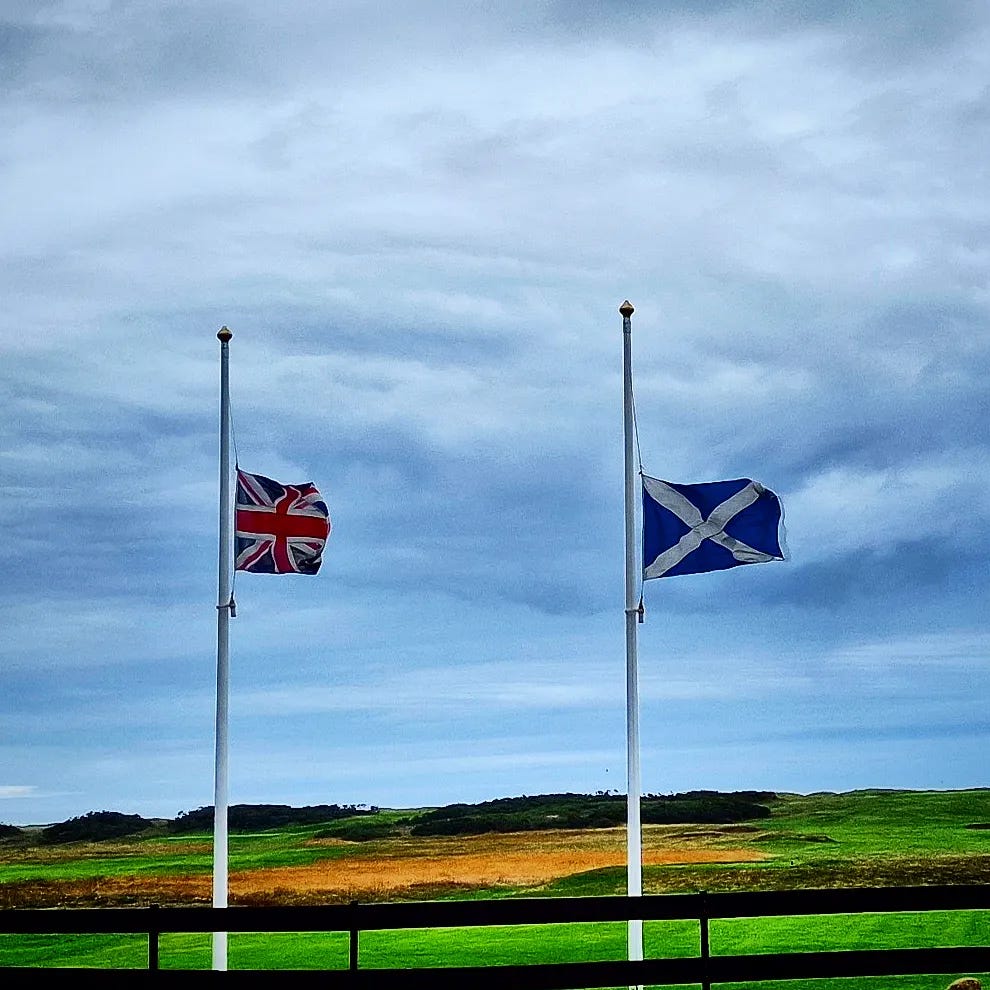
If you are American, like my wife, you are probably deeply confused by the global outpouring of sincere grief at the loss of our Monarch, Elizabeth II. After all, wasn’t she just a boring old lady who didn’t do anything? Isn’t Monarchy and Empire bad? Aren’t British people so stupid? Don’t they know they could have Joe Biden in charge of them instead of all this malarkey?
The shrieking from juvenile leftists on Twitter and in the traditional press this week has been dreadful. Yes, we all get it. You hate authority. You hate wealth. You hate Britain. You believe in a Republic, not a Constitutional Monarchy. And you’re so tough, that ‘you don’t know what the big deal is, she was 96, she wasn’t going to last forever’.
Right?
Tough guys, everywhere, eh?
The day the news broke, I penned an additional Substack article and went for a walk along the storm-battered Angus coastline. When I returned to the ship, we had dinner in the messroom, and the news of Her Majesty’s death was confirmed.
A Merchant Navy mess deck is a merciless place. I will not repeat the details of the gallows humour that filled the air. Needless to say, it revolved around closing the schools in Scotland now that Prince Andrew is in town; The Queen has gone back through the Stargate to lizard-world from her pyramid at Balmoral; Jimmy Saville will fix it, and so on. (Free speech advocates take note. You’d love the Merchant Navy. No HR departments).
With sufficient callousness demonstrated to our fellow men, the bravado subsided. The comments quickly faded, and changed to ‘Nah, The Queen was alright’. ‘This is weird’. Disbelief.
A tinge of sadness crept in. The Queen is the ‘Master of the Merchant Navy and the Fishing Fleet’ of the UK. We lowered our flag to half-mast and made an entry in the logbook. The harbour and the other ships sheltering in port did the same.
A gale of wind and heavy rain battered us through the night, to the next evening.
Moments of grief came in private conversations, one-to-one. ‘I met Charles and Camilla once. They were alright.’ ‘What are we going to do now’? ‘Will we be signed-off in time for the funeral’?
I’m no statist. The primary business of government is warfare. Defence of the realm if we’re being generous. The Queen knew that intimately, as a soldier, and as the Commander in Chief of all our Armed Forces. She has stared evil in the face many times, from the second world war, through to last year’s Afghanistan debacle.
And unlike many of her critics, she personally attended to the wounded and grieving survivors of those conflicts. Unlike the Twitterati, she had the grace to look people in the eye, before and after sending them into real harm’s way.
The current American model of neo-fascistic, monopolistic, deep-state, militarised government is the corporate model taken to its extreme. Endless war, followed by endless medicalisation, spending and inflation. It is the result of an amoral production-line mentality being applied to the affairs of State.
For a nation that claims to hate corruption, and love ‘mom and pop’ stores, Americans should really be better able to discern the advantages of monarchy.
After all, with only two terms in office permitted, a President really has no time to waste in stuffing his pockets with brown envelopes and committing the nation to debts that line the pockets of his political allies before leaving office for the corporate bribe-fest. Nobody changes the oil on a rental car, or in a fascist economy. Ownership is an important value in any leader.
Monarchy is the mom and pop version of an admittedly amoral business. More Tony Soprano, than Robocop. But a family affair, at least.
The whole point of a hereditary system is that the ruler won’t be so corrupt as to squander everything because they need to leave something behind for their children. And not just a trillion-dollar pile of IOUs. Not a concept the current US Democrats are familiar with.
At times like this, when everything is ultra-politicised, it is deeply worrying to see that so few of our loudest fellow citizens have taken the time to actually contemplate what the nation-state is, or what it does.
The first time I had an AK-47 thrust in my face, I was in Ho-Chi-Minh City in Vietnam. It was around 2009, and it was my first time in Asia. I had joined a rather nice cruise ship in Hong Kong, and we were working our way westbound on a world cruise. I was not used to 40°C heat, being born at 58°N in Scotland. Perhaps it was my near translucent skin that attracted attention?
After a long walk around the city, and a nice excursion to an English language bookshop, I sat on a brick wall in the shade to wait for the shuttle bus back to the cruise ship. As I wiped the perspiration from my brow, my hand fell away, and the barrel of a gun came into sharp focus ahead of me.
I was stunned.
A ‘policeman’, in military-looking fatigues, gestured with his gun that I stand up. I couldn’t understand a word of what he was saying but complied with the gesture. I mumbled ‘I’m sorry I don’t understand’, as the blood in my circulatory system tried to remain seated and ended up heading south for my stomach.
He didn’t care. He walked off and kept a beady eye on me from the other side of the street until the bus came.
He didn’t want to steal or extract a bribe from me, charge me with a crime, or inspect my passport. He threatened me with a loaded gun simply because he wanted me to stand up.
In that moment, I didn’t stop to ponder what the structure of government was in Vietnam. Later, on reflection, I was simply grateful that I had grown up in a country where the police did not behave like that. Like the abject and obvious petty thugs that they are in so many countries around the world.
Yes, all forms of government are corrupt. They are based on a variation of the problem, that those who are the best at violence tend to end up exempt from the laws that apply to others. That is the root of nobility and monarchy, it is true. But violence is also the root of revolutionary republics, communist, technocratic, or national-socialist states. Most everything they do depends on the violation of property rights. Taxation is legalised theft.
But at least, in the West, they put on a nice suit and speak to you politely when they’re doing it! Something that should not be under-appreciated.
As we sailed back out to sea, I noticed the poverty of the boat people living on the river. I was struck to see one woman so poor she didn’t have a boat. All of her meagre possessions were laid out on the river rock where she lived.
One older Russian officer told me how much better things now were in Vietnam than in previous years. He recalled coming there in the 1970s on cargo ships and passing dozens of dead bodies floating in the Ho-Chi-Minh River, each time.
I grew up poor, in relative terms, in the UK. But there was never any danger of facing that kind of poverty, or that kind of violence in Scotland.
I have been to every continent except Antarctica. I have seen many countries. And not from the agreeable perspective of a tourist, businessperson, or passenger. I have been there as a working man. Entering via the least well-heeled part of any town – the docks – and dealing with the thuggish authorities of many a government.
I know the flaws of my own country deeper than any American who has never been to Britain. And probably better than most, as the husband of an immigrant. But I am grateful it is not worse.
And in this difficult time, as we as a nation contemplate the death of our Monarch, we face the great equaliser.
Mortality pays no respect to social status, class, ancestry, or wealth. It comes to us all. In this we are equals.
Much of the callous name-calling on social media, or the theories that ‘The Queen isn’t really dead’, comes from a place I know well. The desire to feel strong in the face of mortality.
As a younger sailor, I used to keep a mental note of all the times I could easily have been killed at work. Being crushed by cargo. Asphyxiation or poisoning by dangerous chemicals. Slips trips and falls in a seaway. I’ve witnessed pirate attacks off Somalia, back in the day. Ships catching fire. Flooding. I even fell overboard once and got stuck between a ship and a quay wall.
After a while, your tolerance builds, and some of these ‘near-miss’ incidents don’t bother you anymore.
You realise that a well-found ship can make you feel strong. But that is only temporary. Unless maintained, the natural state of all things is brokenness. ‘A ship only lasts as long as a whores’ moan’, as Frank McCourt would say.
Such adventures are nothing, compared to the moments you may face together with your partner if you are lucky enough to have children together.
Aside from the deeply humbling concern that you do not know if your child will be born healthy, or whether you are about to enter into a lifelong commitment to care for a disabled person, there still remains the risk of death in childbirth.
My wife had an emergent C-section in Charleston SC, after a version-induced labour. So, when we had our second (now-middle) child, Arthur, it was her first natural birth. There were concerns with her C-Section scar initially, and we had tried for a long time to have our second. My wife had suffered circulation issues, so I’d been administering injections to her for several months, daily, to prevent blood clots. There was a concern that these injections might have weakened her previous scar tissue, and that it might open during labour.
As a ship’s medical officer, I was cheerfully hands-on in the delivery room. The nurses commented that most dads would pass out after seeing so much blood, but I enthusiastically helped them clean up as my wife went through a long labour.
When my son was born, he was not crying. He was blue and unconscious. The nurse quickly resuscitated him in a corner of the room right in front of me. As I took my shirt off, the room filled with strangers. I cradled my son on my skin to regulate his heartbeat and maintain his body temperature, as advised. The doctor, midwife, anaesthetist, and surgeon said that my wife was still losing too much blood and that they would like to operate on her. Would she consent?
My wife looked to me in her drug-impaired state for advice. ‘Just say, yes’! I implored.
The time I spent alone cradling my newborn son, contemplating life without my wife, was real and eternal.
Neither my son nor my wife remember that moment. I will never forget it. On that day we were bonded forever, in contemplation of mortality.
That is how our nation feels now.
Searching for a vision of what life will be like, without our matriarch.
I missed my son’s birthday last trip, and my wife’s last week. This year I will not be there for any of my children’s birthdays.
When I call home, my wife says my son is upset the whole time I am away.
He refuses to look at me and hides behind the rocking chair when I make a video call home.
I don’t blame him.
I hate myself for being too absent. Particularly with him. He doesn’t want a conversation at four years old. He wants a wrestling partner. Someone to take him on adventures in the woods. Someone to let him break things with tools in the back garden.
Every family has problems. Death is punctuation in our lives, that forces us to reflect on them.
When my grandmother on my mother’s side passed away, I found it really difficult. Not because I missed her so much.
Truth be told, I didn’t like her much. Particularly near the end. The misery, the guilt trips and the negative comments were too much. I could barely look her in the eye the last few times I visited her.
I know she had a victim story. Her biological father was a POW of the Japanese in WW2. He never spoke of it and died young after the war. She grew up as a troubled stepchild. Alcohol, five children, and at least one miscarriage I know about, brought her to divorce and ruin.
It affected my parents’ marriage, and so much more. The pain of all that trauma has bled through the generations and bruises us to this day.
Sometimes the pain at a funeral is the agony of the knowledge that things didn’t have to be this way.
The pain is that we can now see the final score, and the shortfall against potential redemption that appears so final.
People really loved The Queen. She was a matriarch and a warrior. A presence that gave a sense of memory to our people. A conscience to be faced. The loss of Elizabeth II is a very real blow.
But it is also now an opportunity for the psyche of the nation to realign itself.
Prince Charles, I think, must be the least popular member of the Royal Family. Certainly, among the people I know. And when you look at Andrew, consider, that there was some pretty strong competition. Not just because of his troubled marriage to Diana Spencer, but because of his eco-activism and expensive biscuits. Every time he wades into some campaign of activism, he threatens the equilibrium that is the delicate balance of the body of law that is our constitution.
He will not likely be a defender of the faith, because he is a Gaia-worshipping polytheist. He is a relativist. As such, he cannot respect the covenantal rule of law that stands above him and requires him to subjugate himself to a higher authority.
I hope, like the death of my own two grandmothers, the death of Queen Elizabeth II will act as a call to maturity for the nation. A King, in place of a Queen, is a sign that the adolescence of a long generation is over. A sign that a new age is dawning, and that we need to change.
The cautious apprehension that we feel, as we look at our new King, and our newborn self-image, must not be romanticised or delusional. It must prompt us to look at our lives with freshness and vigour. We must rediscover our history and philosophy and use them properly.
Yes, Charles scares me. He is a limousine liberal, champagne socialist. I don’t believe that he is a Christian. I do not trust his words when he says he will continue to uphold his mother’s legacy.
He has earned no such trust in the popular mind. Not that I can see. Perhaps he will?
However, here is the good news.
I believe he was speaking the truth in his address to the World Economic Forum when he spoke on the topic of the Great Reset. He said that they only have one chance to pull it off and that they ‘may never have this opportunity again’.
Consider why.
The dream of one-world government is nothing new. It has been the dream of every despot since Plato put that poison in Alexander the Great’s mind, and even before.
How different is a social credit score, from your current credit score and tech censorship? How different are CBDCs from an inflation policy that you have no control over, as a consumer? How are digital passports, any different from passports?
When we see that the Great Reset is attempting to achieve a difference of degree, not of kind, then we can begin to tackle the problem seriously.
What has changed is that distributed network technology makes centralised control redundant, in theory. With the advent of the algorithm, there will be no exemptions from the rules. Those people who make unfair wealth and have undue influence due to their magical position as philosopher king, will lose their authority in a rules based economy.
Machines will not have the emotional capacity to fall for their manipulations.
As such, the race is now to centralise the control of decentralised network technology, to secure the hierarchy in place, before all privacy is ended and people can deal with each other entirely peer-to-peer. It is even more of a threat to modern nation states than when radio and TV broadcasting emerged in the 1920s and 1930s, and had to be centrally licensed and suppressed.
We are at war. It is not the economic war with China and Russia they’d have you believe. It is the war for control of the new world order after the next financial collapse.
If it weren’t for blockchain, the internet and nuclear weapons, we’d probably just be having a conventional war between states. But we’re not.
And here’s what Charles understands about that.
The reason they may never have this chance again is because the same technology they would use to enslave us permanently, can be used to defend ourselves against the corruption of the overgrown state, permanently.
After the blatant hypocrisy and evil of the post-2008 ‘too-big-to-fail’ bail-ins, people got busy on the internet making sure that more folk than ever were aware of the scam that is fiat currency, and the evil stealth tax that is currency inflation. Operation mockingbird showed cracks.
The tools to live without these evils already exist, and that is why the WEF, and the UN countries are overplaying their hand in a mad rush to preserve their control over a dying order. Their survival, as net consumers, depends on it.
The feminists hate The Queen because she was a soldier, a head of state, a defender of Christianity, of charity, and a mother. All while calling each other ‘Queen’, unironically. They hate her because she was a conservationist of the English Reformation. They hate her for not being a cry-bully victim or a socialist. The socialists in general hate her because they want the power. And boy, would they use it. Democrats hate her because they hate everything that isn’t sanctioned by the mob at any given moment. She was a colonialist. She decolonised too quickly. She was too wealthy. Take your pick. I’m not going to debate the details. Read Niall Ferguson’s Empire, or Vishal Mangalwadi’s The Book That Made Your World, before you go down that road.
So, here’s the problem with the Queen-haters on the internet. Resentment solves nothing.
What each of these groups fails to do, is imagine how much worse things could be. If we’d had Charles when he was 23 years old, instead of now at 73, how difficult would this transition be. Having sailed with a chief officer who trained under his father, I for one am grateful at how old Charles III is on taking the throne.
At the very least, you should love your enemy long enough, to study what makes them powerful, effective, and persuasive opponents. Even if you consider monarchy a great evil and injustice, look at how they behave. Perhaps you might be able to use the same wind that fills their sails, to power your own vessel forward?
We have to understand the world a little better if we hope to improve it. The shrieking achieves nothing. Know that people in power are running a defence corporation. Know that they are just people. They are judged in the aggregate by the same universal standards that we are all subject to. Know that those people too, can again be subject to the rule of law, and not simply the law of rulers.
But to get there, we must learn to rule ourselves.
What we often fail to consider, is that our own failings as citizens that give the state so much power over our lives in the first place. Let us take this time to consider the virtues of Elizabeth II, as a flawed, personal, human leader. As we do when we consider the living God.
Let us consider, that if we too act like sovereign monarchs, perhaps we won’t need government to rule us at all. And, perhaps, if we were better people, our leaders too might be better.
Perhaps the symbolic job of a Monarch, really is to provide an example of how we should be, in this world.
I think HM Elizabeth II genuinely tried to do that, sincerely and voluntarily. In this wicked world of ours, I think we should all be grateful for her having been in it. Even if it was all an act, and she was really evil, what she represented remains.
And I pray to God, that King Charles III learns to restrain himself and follow his mother’s example. As we all should.
